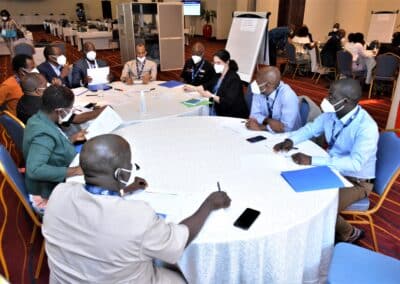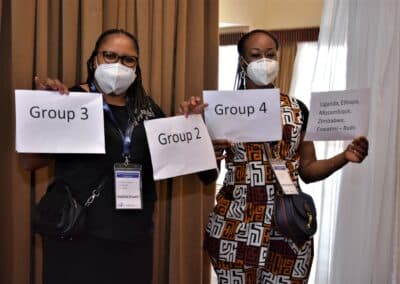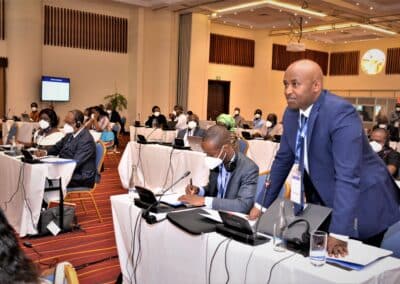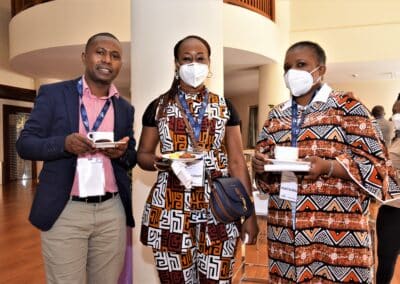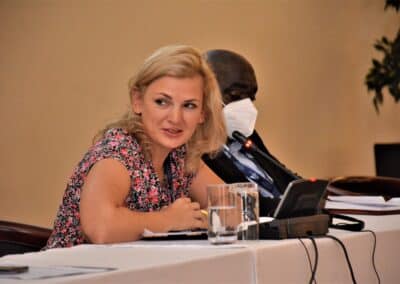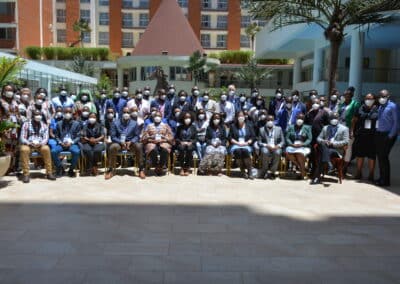ICAP’s CQUIN team hosted 54 Ministry of Health colleagues, including differentiated service delivery (DSD) coordinators and care and treatment leads. The workshop, which took place in Nairobi, Kenya, focused on strategic planning, communities of practice, country-to-country visits, and ways to enhance and update CQUIN’s capability maturity model dashboard.
From February 28 to March 2, 2022, participants reviewed the CQUIN DSD capability maturity model dashboard, CQUIN network focus areas and communities of practice, and the CQUIN approach to country-to-country learning visits. Countries also shared their experiences and lessons learned from engaging with CQUIN over the last five years, as well as shared successes and challenges.
“Our MOH colleagues are essential to the scale-up of DSD in network countries, and to the success of the CQUIN network,” said Miriam Rabkin, MD, MPH, ICAP’s director for Health Systems Strategies and CQUIN principal investigator. “As key stakeholders, we wanted to ensure that they had time to do a ‘deep dive’ into network strategies and plans, and to get their feedback on what is working well and what we can add or improve,” Rabkin said.
Day one of the meeting included a review of CQUIN network goals, objectives, activities, and strategies, as well as the impact of CQUIN on DSD scale-up in partner country programs.
On day two, participants reviewed proposals for a new and expanded CQUIN DSD dashboard, breaking into small groups to provide detailed feedback on each domain. The group also discussed CQUIN communities of practice, with updates from the M&E, Advanced HIV Disease, and Quality/QI communities of practice and a preview of the planned differentiated HIV testing services (dHTS) community of practice.
On the final day of the meeting, participants reviewed CQUIN country-to-country (C2C) learning visits, with a presentation and small group discussions to provide detailed feedback on C2C standard operating procedures. “We realized the term ‘south to south visits’ was dated,” said Dr. Peter Preko, CQUIN project director, noting that participants felt the term country-to-country was preferable.
“The meeting helped me understand DSD better and was also an opportunity to be oriented on my role as Ghana’s DSD focal person,” said Raphael Adu-Gyamfi, MD, Ghana’s National AIDS Control Program DSD focal person. “The interactions with fellow participants were great learning moments for me. Also, involving the MOH HIV treatment lead in the meeting helped facilitate planning for relevant changes that Ghana needs to make to accelerate progress towards achieving optimal DSD care,” said Adu-Gyamfi.
“We were able to review and provide inputs for some of the key tools and approaches used by CQUIN, including the DSD dashboard, country-to-country visits, and communities of practice,” said Lazarus Momanyi, MBChB, MPH, DSD coordinator at Kenya’s National STI Control Program, NASCOP. “This will promote some level of ‘ownership,’ especially for the MOH teams as we begin the implementation of CQUIN 2.0. In addition, the participation of the Kenya Care and Treatment lead in this meeting was invaluable. It will go a long way to ensure the integration of DSD activities into the MOH work plan moving forward,” added Momanyi.
Moving forward, ICAP’s CQUIN leadership will follow up with countries on their involvement in communities of practice. CQUIN will also update the country-to-country standard operating procedures and associated tools and support countries to pilot the CQUIN treatment dashboard in advance of the CQUIN Annual Meeting in December 2022.


